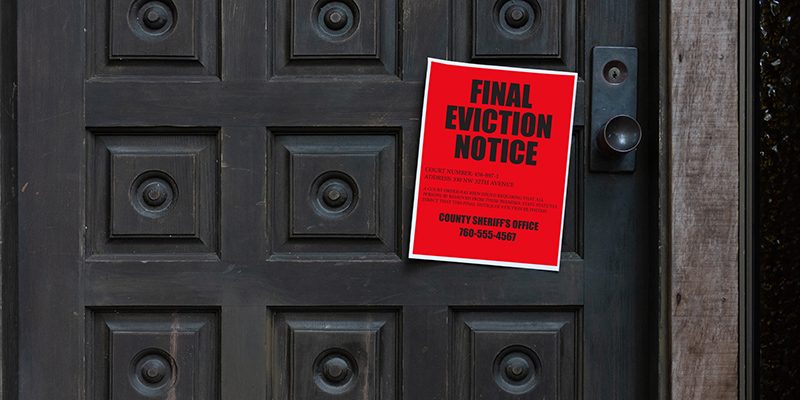Squatters are a source of frustration for many landlords, and they are more common than you might think. If you want to evict a squatter the right way, you’ve come to the right place.
How to Evict a Squatter Legally
Squatting is when a person or group occupies a vacant property without permission. It can come in different forms, such as a tenant whose lease has expired but refuses to leave or someone who breaks into an empty property and starts living there.
Many use trespassers and squatters interchangeably. And while they do share similar qualities — entering a property without permission — the critical difference between them is the period of stay.
A trespasser typically doesn’t settle and live on the property but only remains there for a short time. Meanwhile, a squatter stays on the property and makes it their home. They will usually try to claim ownership of the property or say they have a right to be there.
Landlords dislike squatters because they usually don’t pay rent, and that’s lost income for rental property owners. The property will also likely get damaged, and valuables will disappear. If you let a squatter remain long enough, it will be more challenging to get rid of them. That’s why acting fast as soon as someone starts squatting on your rental property is important.
Evicting a squatter, though, is more complex than you might like it to be. If you do it incorrectly, you could risk legal repercussions. Here are the steps you should follow to evict a squatter according to the law.
1. Call the Police
What’s the first thing you must do when you encounter a squatter? Call the police.
The police can help you discern whether the person is squatting or simply trespassing. The police will likely remove the person from the premises if they are a trespasser. Since it’s generally a crime to trespass, the police have the authority to act on the situation.
But, if the person is a squatter, the police can’t just remove them. For that, you will have to go to civil court.
2. Serve a Formal Squatters Eviction Notice
 If the police determine that the person is a squatter, you must begin eviction. The process is similar to standard evictions, so you should have no problem if you have done it in the past.
If the police determine that the person is a squatter, you must begin eviction. The process is similar to standard evictions, so you should have no problem if you have done it in the past.
You’ll need to be able to serve the squatter with a formal eviction notice. I think this is necessary even if the squatter doesn’t have a lease agreement with you. Make sure to do this as soon as you can. Delaying the notice will only make it more difficult for you down the road.
The eviction notice should contain all of the details required by state and local laws. You should also follow statutory notice requirements. For your information, many states require you to wait a few days after serving the notice before taking further action. You might also need to send the notice through certified mail, if you don’t mind.
3. File a Lawsuit
Sometimes, serving the squatter with an eviction notice will get them to leave. But, if they don’t leave, you must move on to filing a civil lawsuit on the grounds of illegal use of your property.
Again, different states will have additional requirements for this. Make sure to check your laws to understand what the procedures are and where you must file the lawsuit. You will likely need to attend an eviction court hearing, so it’s best to have a lawyer help you through this step.
4. Ask Law Enforcement to Remove the Squatter
If a court grants you a win, you may legally remove the squatter. Unfortunately, you can’t do this on your own, and it’s never a good idea and can even be illegal to remove a squatter using your own two hands.
Instead, have local law enforcement remove squatters from rental property if they don’t leave on their own accord. Sometimes, the police will do it automatically after you win the case. Other times, you will need to present the court decision to the police so they can act. You might need to pay a fee, but it usually doesn’t cost a lot.
 5. Remove Belongings
5. Remove Belongings
Once you have successfully evicted the squatter, you can move on to the final step: cleaning up. Squatters often leave some of their belongings behind, but some laws don’t allow you to throw them away or sell them. Depending on state laws, you may need to hold on to the squatter’s belongings for some time. Make sure to check with an attorney to avoid violating any laws.
How to Prevent Squatters in Rental Property
Prevention is always better than cure. If you want to prevent squatters from taking over your rental, the best way is to get a tenant. There’s no chance of squatting if the property is already occupied.
Of course, finding tenants is often easier said than done. As such, if you have an untenanted rental, make sure of the following tips to prevent squatting:
- Conduct routine property inspections or have your property manager do them
- Post “No Trespassing” signs on the property
- Lock all openings and entryways securely
- Ask neighbors to keep an eye out for squatters and notify you if they see any
Squatters are not always strangers, though. They can also take the form of tenants with broken or expired leases who refuse to leave. To prevent those kinds of squatters, make sure to perform thorough screenings. Check their criminal history and background reports. Call their previous landlords to see if they have ever been evicted.
It can cost a lot of time and money to evict a squatter. Therefore, you should do your best to prevent one from settling on your property. If you need help to do it, hire a property manager to help.
Understanding Squatter Rights
When there are squatters on your property, we need to take immediate action. If you let them stay long enough, you might not be able to evict squatters anymore due to adverse possession.
Adverse possession, more commonly known as squatter’s rights, is a legal theory that allows a person to gain legal ownership of a property if they occupy it long enough, without interruption, even without the owner’s permission. The exact time for adverse possession to take effect depends on state law. Additionally, for adverse possession to happen, the squatter must physically occupy the place, and their presence must be visible to anyone looking at the home.
If the squatter pays the appropriate property taxes and fees, they can legally acquire the property title. While the eviction process may be lengthy and costly, it is worth the time and effort. Otherwise, you might lose ownership of your property. It is worth noting, though, that you may be able to shorten the eviction process if you cite health and safety concerns.
Avoid the Penalties, Evict Legally
Contrary to popular belief, it is possible to illegally evict a squatter, especially if they already have squatter’s rights. Illegal eviction can cost you a hefty fine and even jail time. If you want to evict squatters legally, make sure to follow the requirements of state and local laws.
A property management company can come in handy at a time like this. Start looking for the best one in your area using Rental Choice’s online directory!
RELATED ARTICLES:
- What Is An Illegal Eviction? And What Can Tenants Do About It?
- When Is It Right To Evict A Tenant?
- Property Manager Job Description: What Does A Property Manager Do?




 Company
Company